June 19th, 2010
Could 20th CENTURY BOYS be the next LOST?
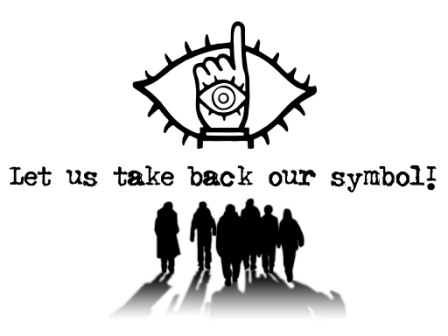
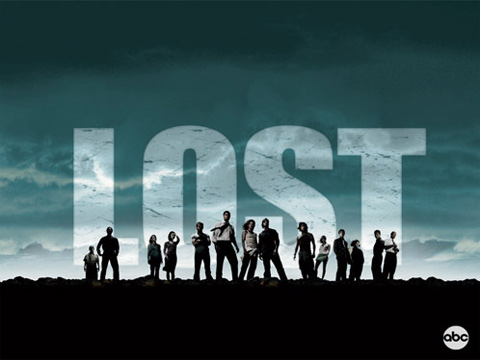
Hmmm…
A month ago, I saw two sci-fi/mystery-driven series come to an end — the ABC television show LOST and the Japanese film version of Naoki Urasawa’s 20th Century Boys. LOST completed its six year run with a two-and-a-half hour episode, fittingly titled “The End,” while 20th Century Boys had, of course, already ended — twice, in fact. The first time was in the pages of Japan’s Big Comic Spirits in 2007, and the second time occurred with the live action film adaptation, a three-film epic that concluded with 2009’s 20th Century Boys 3: Our Flag. Whereas I watched LOST on “live TV,” I had to catch up to 20th Century Boys via a Hong Kong-pressed DVD.
As far as finales go, the two franchises were like night and day. LOST pretty much got the “feeling” right, delivering an emotionally satisfying conclusion that reminded us why we liked the show in the first place. We may have come for the mystery, but it was the characters and their relationships that kept us interested. I always thought that the obsessive attempt to decode of all the minutiae and Easter eggs the showrunners would include was a) for geeks only and b) would lead NOWHERE. By the time the final episode aired, I stand vindicated. In any event, I would say that the emotional resonance of LOST’s final episode can be chalked up to the performances of America’s finest television ensemble, the musical talents of Michael Giacchino, and a resolution to the alt-reality storyline that felt like a celebration, rather than a wake (ironic, if you’re aware of the content of the show’s ending). I also loved the Flying Jack Punch (enhanced version posted below):
That’s not to say that LOST didn’t get a lot wrong. The show started out as a covert sci-fi series and slowly crossed the threshold into a huge Good vs. Evil fantasy epic. There’s nothing wrong with that, but the resolution to the Island storyline was less than satisfying. Sure, Jacob was not God, the Man in Black (aka Smokey) was not the devil, and The Island was neither heaven nor hell nor even purgatory (a fact that some viewers STILL got wrong), but its importance was never fully illustrated, as it was never explained what it was, why it should be protected, and why the MiB should be contained. Yes, he’s a homicidal jerk, but would it really be Armageddon? In essence, the Island was a big MacGuffin, and that’s a huge disappointment even for viewers who weren’t obsessively trying to “figure it out.” As far as the deployment of mythology goes, the writers dropped the ball all season. Oh, and that final scene, the one that so poignantly bookended the entire series, would have had even more resonance if a) more Losties were actually on that plane leaving the island and b) half of the castaways hadn’t ALREADY left the island in an earlier season only to come back. Ah, the perils of episodic television…
As I said before, in comparison to LOST, 20th Century Boys delivered the exact opposite experience. The questions that pervaded the series’ mythology — who is Friend? What’s his endgame? Why is he such a creepy bastard? — mostly get answered. The filmmakers gave the audience a good sense of what the stakes were, how it affected the protagonists, etc. And for the most part, these elements came together into a fairly satisfying resolution that trumps LOST in coherence — which is saying something, because 20th Century Boys is not only pretty dense in its storyline, it’s also fairly ludicrous.
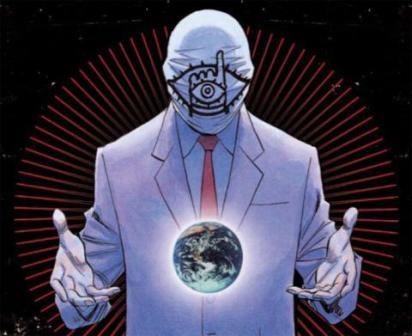
But as far as delivering an emotionally satisfying conclusion, the movie stinks. To the film’s credit, the climax contains a moment of triumph involving tagteam action on a robot (definitely NOT what you’re thinking!) and a callback to a childhood moment of solidarity that I thought was really cool, but the long-awaited reunion at the seeming end of the film falls so flat, it’s kind of embarrassing. And what’s really bizarre is how the film proper finally ends — the filmmakers give us a shockingly touching coda that takes place in the past that’s so good it seems to belong in a completely different, non-cheesy sci-fi movie. Too bad the scene is marred by the fact that it’s virtual reality — which means it NEVER ACTUALLY HAPPENED! *sigh*
I mean, aside from big moments like this, did any of you really care about the characters? Aside from protagonist Kenji, the film’s resident badass Otcho, and maybe Kenji’s niece, Kanna (who has somehow morphed into the Morning Musume version of Che Guevera), the other characters are pretty much equivalent to cannon fodder (although few die, if any). Even worse, the handling of emotions is laughable and incredibly cheesy — do mainstream Japanese directors not know how to handle poignant moments? Why does it always devolves into those sappy “Let’s do our best!” scenes, complete with fake crying that’s supposed to pull at the heart strings, but is just so damn embarrassing for the filmmakers and actors involved?
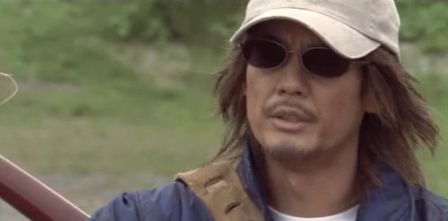
“Hey, I may look ridiculous. But I’m supposed to be Bob Dylan meets John Lennon meets Jesus Christ.”
If anything, the epic eight-hour long trilogy proved to me that the manga doesn’t translate well to film, as everything gets crammed in via exposition — it either doesn’t make sense or it feels dramatically insubstantial. I haven’t finished the manga (the English translation is only up to Vol. 8), but I got to thinking, what if 20th Century Boys was adapted into an American series? Would it work?
I think the show could retain the same title (the T.Rex song HAS to be the theme), but as far as the pivotal event occurring on New Year’s Eve of 2000, I don’t think it would be advisable. The events of the manga have to feel like it COULD happen, and if the show is, by default, an alternate history, then I think it loses some of the necessary dramatic resonance for American viewers to tune in week after week. I would set it in the year 2012 (another significant “end of the world” date) or some arbitrary date in the future that has special meaning for the characters. As much as I would like the show to be set in rural Oklahoma, it would make a lot more sense for it to be set in New York City — the de facto Hollywood setting for alien invasions, natural disasters, Godzilla attacks, etc — as it’s the only American city comparable to Tokyo.
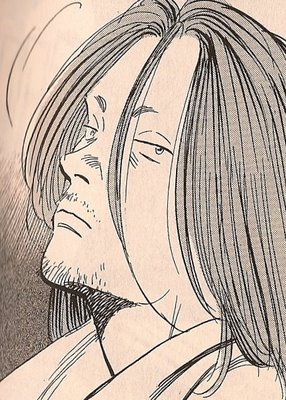
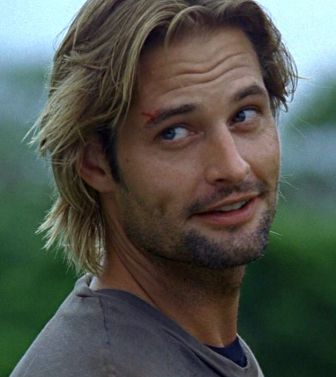
Josh Holloway as Otcho. Make it so!
Most television shows have 2-3 principal actors that you’re invested in, and the rest are simply there for support. That’s not how 20th Century Boys should operate, even though that seemed to be the way the film adaptation approached the material. As LOST proved, casting an ensemble show is crucial, and if you do it right, you can put the dramatic burden on pretty much any of the actors for a single episode and keep the viewers interested. Putting the spotlight on characters other than Kenji, Otcho, and Kanna would be crucial for any American adaptation of the manga. Like LOST, Naoki Urusawa’s manga relies on flashbacks, but whereas LOST initially focused on any part of the lives of the characters before they arrived on the island (usually as adults), 20th Century Boys delves into a specific forgotten period during the boys’ childhood. Unless they find the modern equivalent of Emmanuel Lewis or Gary Coleman (RIP), this fact may present a casting problem, as young actors will inevitably grow up (see Walt in LOST) and need to be replaced. I think any American show would have to account for the differences in the Japanese and American public school system and include flashbacks to the characters lives as high schoolers as well. It may cause some headaches in ironing out the mythology of Friend’s ascension, but it would also open the show up to new possibilities beyond the sepia-toned childhood days of the main characters.
Personally, I think a season-long mystery arc that begins with an investigation to uncover Friend’s identity and ends at the most apocalyptic moment of the Bloody New Year’s Eve massacre would make for an unforgettable Season 1 debut. The real challenge comes immediately thereafter, as the manga then jumps 15 years in the future. I’m not sure if seeing the regulars of Season 1 in old-age makeup for the remainder of the series would be credible to American viewers.
A second problem is the sci-fi element. LOST was very good in the first few seasons of disguising it — by the end, they had time travel, a purported alternate universe, and a battle between two seemingly God-like entities. While some viewers really dug it; others didn’t. 20th Century Boys has a bigger problem — robots. While the design is based on Mazinger Z and other childhood mecha faves, any American version is going to have to seriously consider an effective replacement. What would American kids fantasize about? I think recontextualizing the show within American superhero comics would help with a solution (BTW: unlike the understandably mono-ethnic Japanese version, I think the American version should be ethnically diverse and have Japanese American character with a fondness for Ultraman).
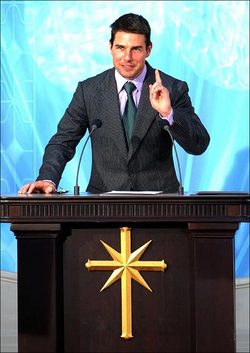
Wow.
The final problem involves Friend himself — his real identity, his mask, his cult of followers, and his eventual reign of terror. As to Friend’s true identity, all I can say is that it has to be someone from the original circle of Kenji’s pals. They have to be established within the first episode — anything else is cheating. I love the manga, but the one gripe I have is how the main characters keep remembering new people just so we have new suspects. It’s kind of silly, and it would be infuriating, if the manga weren’t so engrossing. And what about that goddamn mask? Who in their right mind would follow a dude in a mask who talks like a weirdo? While I think a mask of sorts can be explained via American superhero comics (Friend could become like Batman crossed with Jesus), it might be more effective to have a public face of the cult who is not really Friend, but is initially believed to be. In an American context, I think the depiction of the cult should not just be a riff on Christian mythology as the original manga was, but also be a parody Scientology and have a Tom Cruise-like spokesman to boot. Maybe he’s one of the characters from childhood with plastic surgery or maybe there’s another character behind the scenes who is the show’s resident puppet master, pulling everybody’s strings. In any event, the cult has to be believable, and Friend’s eventual status as a politician has to resemble reality in some recognizable way. The recent remake of V, I’m told, tried to capitalize on Obama’s message of change and the conspiracy theories surrounding him. Similarly, any American adaptation of 20th Century Boys has to use the political, religious, and cultural landscape of the U.S. in forging its own path.
What do you all think?


February 9th, 2011 at 12:12 pm
[…] can be a little daunting at times. In truth, the manga feels a lot like the television show, Lost, especially in the way that the earlier volumes held so much promise, while the later ones felt […]